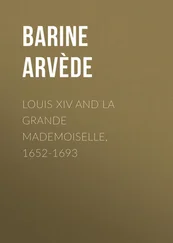The Apartment, which, however heavy in appearance, was full of interest to, me, seemed quite short. It finished by the supper of the King. His Majesty appeared quite at ease. Madame's eyes were full of tears, which fell from time to time as she looked into every face around, as if in search of all our thoughts. Her son, whose eyes too were red, she would not give a glance to; nor to Monsieur: all three ate scarcely anything. I remarked that the King offered Madame nearly all the dishes that were before him, and that she refused with an air of rudeness which did not, however, check his politeness. It was furthermore noticeable that, after leaving the table, he made to Madame a very marked and very low reverence, during which she performed so complete a pirouette, that the King on raising his head found nothing but her back before him, removed about a step further towards the door.
On the morrow we went as usual to wait in the gallery for the breaking-up of the council, and for the King's Mass. Madame came there. Her son approached her, as he did every day, to kiss her hand. At that very moment she gave him a box on the ear, so sonorous that it was heard several steps distant. Such treatment in presence of all the Court covered with confusion this unfortunate prince, and overwhelmed the infinite number of spectators, of whom I was one, with prodigious astonishment.
That day the immense dowry was declared; and on Sunday there was a grand ball, that is, a ball opened by a 'branle' which settled the order of the dancing throughout the evening. Monseigneur the Duc de Bourgogne danced on this occasion for the first time; and led off the 'branle' with Mademoiselle. I danced also for the first time at Court. My partner was Mademoiselle de Sourches, daughter of the Grand Prevot; she danced excellently. I had been that morning to wait on Madame, who could not refrain from saying, in a sharp and angry voice, that I was doubtless very glad of the promise of so many balls—that this was natural at my age; but that, for her part, she was old, and wished they were well over. A few days after, the contract of marriage was signed in the closet of the King, and in the presence of all the Court. The same day the household of the future Duchesse de Chartres was declared. The King gave her a first gentleman usher and a Dame d'Atours, until then reserved to the daughters of France, and a lady of honour, in order to carry out completely so strange a novelty. I must say something about the persons who composed this household.
M. de Villars was gentleman usher; he was grandson of a recorder of Coindrieu, and one of the best made men in France. There was a great deal of fighting in his young days, and he had acquired a reputation for courage and skill. To these qualities he owed his fortune. M. de Nemours was his first patron, and, in a duel which he had with M. de Beaufort, took Villars for second. M. de Nemours was killed; but Villars was victorious against his adversary, and passed into the service of the Prince de Conti as one of his gentlemen. He succeeded in gaining confidence in his new employment; so much so, that the marriage which afterwards took place between the Prince de Conti and the niece of Cardinal Mazarin was brought about in part by his assistance. He became the confidant of the married pair, and their bond: of union with the Cardinal. His position gave him an opportunity of mixing in society much above him; but on this he never presumed. His face was his, passport with the ladies: he was gallant, even discreet; and this means was not unuseful to him. He pleased Madame Scarron, who upon the throne never forgot the friendships of this kind, so freely intimate, which she had formed as a private person. Villars was employed in diplomacy; and from honour to honour, at last reached the order of the Saint Esprit, in 1698. His wife was full of wit, and scandalously inclined. Both were very poor—and always dangled about the Court, where they had many powerful friends.
The Marechale de Rochefort was lady of honour. She was of the house of Montmorency—a widow—handsome—sprightly; formed by nature to live at Court—apt for gallantry and intrigues; full of worldly cleverness, from living much in the world, with little cleverness of any other kind, nearly enough for any post and any business. M. de Louvois found her suited to his taste, and she accommodated herself very well to his purse, and to the display she made by this intimacy. She always became the friend of every new mistress of the King; and when he favoured Madame de Soubise, it was at the Marechale's house that she waited, with closed doors, for Bontems, the King's valet, who led her by private ways to his Majesty. The Marechale herself has related to me how one day she was embarrassed to get rid of the people that Madame de Soubise (who had not had time to announce her arrival) found at her house; and how she most died of fright lest Bontems should return and the interview be broken off if he arrived before the company had departed. The Marechale de Rochefort was in this way the friend of Mesdames de la Valliere, de Montespan, and de Soubise; and she became the friend of Madame de Maintenon, to whom she attached herself in proportion as she saw her favour increase. She had, at the marriage of Monseigneur, been made Dame d'Atours to the new Dauphiness; and, if people were astonished at that, they were also astonished to see her lady of honour to an "illegitimate grand-daughter of France."
Конец ознакомительного фрагмента.
Текст предоставлен ООО «ЛитРес».
Прочитайте эту книгу целиком, на ЛитРес.
Безопасно оплатить книгу можно банковской картой Visa, MasterCard, Maestro, со счета мобильного телефона, с платежного терминала, в салоне МТС или Связной, через PayPal, WebMoney, Яндекс.Деньги, QIWI Кошелек, бонусными картами или другим удобным Вам способом.












